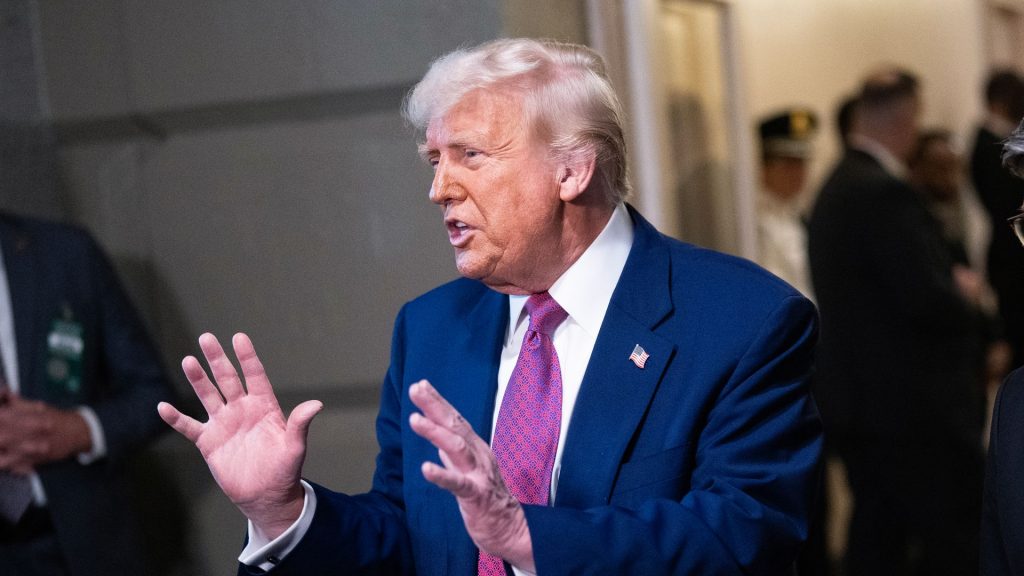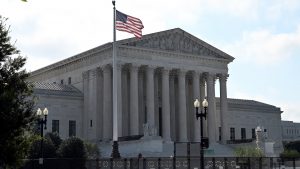US already ‘crossed the line’ into authoritarianism, experts warn

Experts on authoritarianism have long sought to raise warnings and public awareness about the dangers of democratic backsliding around the world. Those experts are now increasingly issuing similar warnings about the United States.
‘Crossed the line’
A few weeks into President Donald Trump’s second term, a majority of U.S. political scientists agreed in a survey that the country was swiftly moving towards a more authoritarian style of government.
Now, four months in, some experts are saying the United States already “crossed the line” from democracy into what they call competitive authoritarianism.
Experts said in a competitive authoritarian system, democracy still has a chance to rebound, even if the odds are stacked against it.
Unbiased. Straight Facts.TM
In a competitive authoritarian system, democracy still has a chance to rebound, even if the odds are stacked against it.
The warnings come as experts and refugees from other authoritarian-type regimes have also become more vocal, speaking on talk shows and writing essays examining the similarities between current events in the United States and the events they once witnessed in their home countries.
Two of the biggest areas of concern that experts consistently identify are the deterioration of the rule of law and a prevailing fear of retaliation that discourages people from speaking freely.
Rule of law
Some of the most urgent warnings have come from top conservative legal voices and former conservative judges, with J. Michael Luttig warning explicitly about “the end of rule of law in America.”
United States Supreme Court Chief Justice John Roberts similarly warned that the rule of law itself is now in danger and that Americans must defend it.
Judges across the country also spoke out against extremists targeting themselves or their family members after they ruled some Trump administration actions to be illegal, or else paused those actions pending further judicial review.
‘We are all afraid’
While most Republican officials expressed continued support for the president, some have spoken out against what they say is a palpable culture of fear and intimidation within the Republican Party.
“We are all afraid,” U.S. Sen. Lisa Murkowski, R-Alaska, said of Trump. “I am oftentimes very anxious myself about using my voice, because retaliation is real. And that’s not right.”
Experts who fled other authoritarian regimes say that this intimidation is key not only against other politicians, but against traditionally independent pillars of modern civil society, including law firms, universities, the civil service and the free press.
The Trump administration has repeatedly taken action against these and other institutions over the past four months, and is now engaged in an escalating legal battle against Harvard University.
GOP support, pushback
Republicans in Congress have remained largely supportive of Trump’s actions since his return to the White House. Murkowski’s candid public statement was an exception to that rule.
Recently, however, there has been some pushback against Trump administration officials perceived as particularly extreme. Ed Martin, formerly the Acting U.S. Attorney for the District of Columbia, was forced out of his position after failing to secure unanimous Republican support in committee. Instead, Trump is moving Martin into a role where he will reportedly be free to pursue the president’s perceived enemies in cases where the Department of Justice does not have sufficient evidence to charge them through normal legal processes.
Trump responds
When directly asked in an interview whether he was “taking the country down an authoritarian path,” Trump indicated his belief that the American people chose this path when they voted for him in November 2024.
In that election, Trump became the first Republican candidate in 20 years to win the national popular vote for president. He cited that historic victory to justify some of the actions he and his administration have taken since returning to office.
In the same interview, the president was asked if he has a duty to uphold the United States Constitution, which judges and legal experts say he or his administration has repeatedly violated. He replied: “I don’t know.”
Trump swore his oath of office during his inauguration on Jan. 20, 2025, which reads in part: “I…will to the best of my ability, preserve, protect and defend the Constitution of the United States.”
What happens next?
While political scientists said it is important to be aware of the dangers of authoritarianism and of how it is now impacting American politics, they also warned against feeling hopeless. Many cautioned against viewing authoritarianism as inevitable, pointing instead to recent events in Poland, South Korea or Brazil to highlight how authoritarian states can swing back towards democracy after briefly crossing over into authoritarianism.
Alternatively, they warned that events in Russia, Hungary and Turkey demonstrate how authoritarian states can continue consolidating power until they approach the point of totalitarianism, an extreme form of authoritarianism. Experts say this is particularly true in Russia’s case, a nation political scientists regard as one of the least free countries in the world.
While most experts agreed that the United States is not at that point, they cautioned that this is a crucial time for Americans to decide which direction their country will move towards in the months and years ahead.





